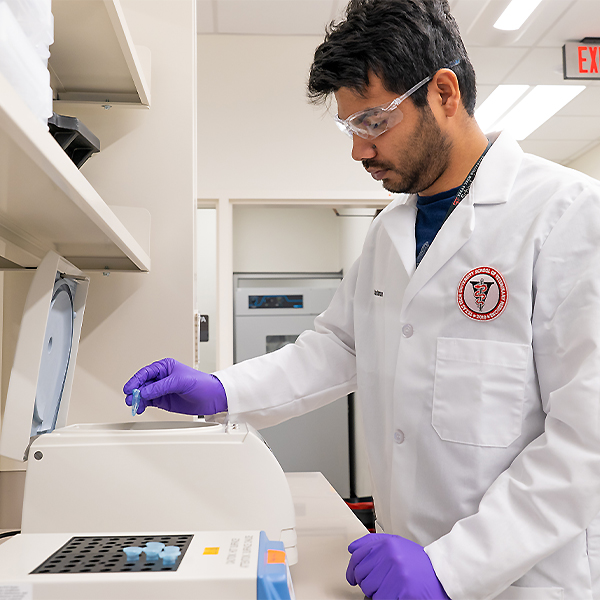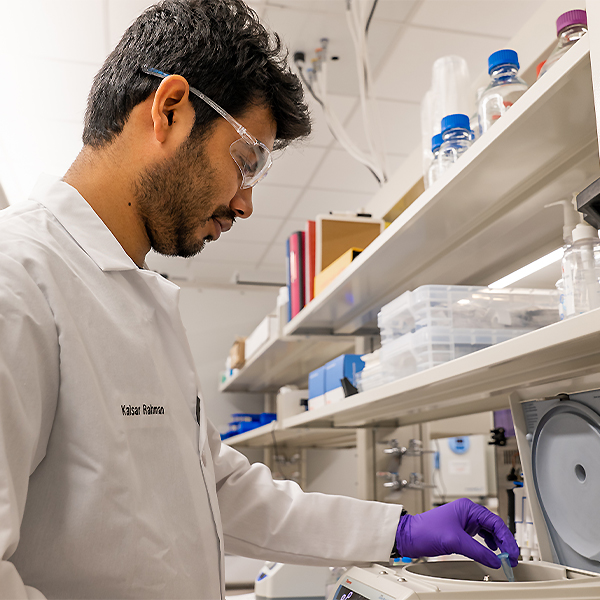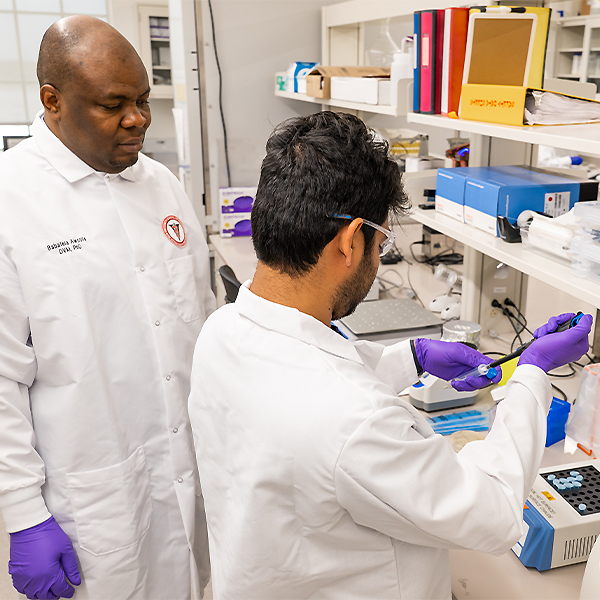
This School of Veterinary Medicine One Health Sciences PhD student is helping address complex health challenges in human, animal and ecosystem health.
Md. Kaisar Rahman never thought one day his academic journey would lead him to Amarillo, Texas. He is part of the inaugural class in Texas Tech University's School of Veterinary Medicine's innovative PhD in One Health Sciences.
Rahman is originally from Dinajpur, a town in the vibrant country of Bangladesh located in Southeast Asia. Prior to Texas Tech, he graduated with his veterinary degree and master of science in epidemiology at Chattogram Veterinary and Animal Sciences University in Chittagong, Bangladesh.
He also served as a research officer in epidemiology, contributing to the mission of both EcoHealth Alliance in the United States and the Institute of Epidemiology, Disease Control, and Research in Bangladesh. Let's get to know Md. Kaisar Rahman.
What are you passionate about in research and in One Health?
I am deeply passionate about the realm of antimicrobial resistance and its intersection with One Health research. I am deeply committed to addressing the issue of drug-resistant infections, where microorganisms are evolving to resist treatments that were once effective. Through the One Health framework, I am driven to understand and emphasize the intricate connections between human health, animal health and the ecosystem. This interdisciplinary approach not only broadens our perspective but also magnifies the collective impact of our efforts. With a fervent commitment to collaboration among healthcare professionals, researchers, veterinarians, and policymakers, I aspire to contribute to the development of holistic strategies that combat antimicrobial resistance. By fostering awareness, advancing innovative treatments and advocating for responsible practices, my passion lies in forging a future where the health of all living beings thrives symbiotically with the delicate ecosystems we inhabit.
How did you become interested in pursuing One Health?
After completing my studies and delving into research, I came to a profound realization regarding the paramount importance of One Health – how its interconnectedness threads through the realms of humans, animals and ecosystems. This understanding gained even greater resonance during the global upheaval caused by the COVID-19 pandemic. The world at large experienced, in a deeply resonant way, the intricate significance of One Health in safeguarding our collective well-being. Motivated by this acute awareness and a genuine thirst to comprehend the far-reaching impacts, I am now driven to pursue my doctorate in the field of One Health sciences.
What did it mean to you to be part of the inaugural Ph.D. cohort at the School of Veterinary Medicine?
Being a part of the inaugural class of One Health PhD students at the School of Veterinary Medicine held profound significance for me. It signified the opportunity to lay the foundation for groundbreaking research and academic exploration within the realm of veterinary medicine. As a pioneer in this program, I felt a strong sense of responsibility to contribute to shaping its trajectory and potential impact on the field. It was a chance to collaborate with esteemed faculty and fellow students to chart new academic territory, set standards, and push the boundaries of knowledge. This experience represented not only personal growth but also a commitment to advancing veterinary science and healthcare through rigorous inquiry and innovation.
What led you to decide Texas Tech was the place you wanted to pursue your career in
One Health?
My decision to choose Texas Tech was driven by several compelling factors. Firstly, it's commitment to One Health mirrored my own beliefs about addressing complex health challenges. Furthermore, the exceptional faculty and researchers at Texas Tech, renowned for their contributions to veterinary and health sciences, were a major draw. Texas Tech's investment in cutting-edge facilities and resources was another key consideration. The state-of-the-art infrastructure promised a conducive environment for high-impact research and learning, critical for pushing the boundaries of One Health understanding. Lastly, the vibrant academic community and diverse student body at Texas Tech promised a rich exchange of ideas and perspectives, fostering an environment where innovation thrives.
What is your research focus?
In a broad sense, my research revolves around the pivotal theme of antimicrobial resistance within the context of One Health. To delve deeper, I am particularly engrossed in studying the epidemiology of beta-lactamase resistance genes at the intricate junctures where animals, humans, and the environment intersect, specifically within the United States.
Who is your mentor and how are you two working together?
I am fortunate to be working under the guidance of Dr. Babafela Awosile, a distinguished researcher in the field of epidemiology and One Health Science. Dr. Awosile's extensive expertise in both areas has significantly shaped my academic journey and research pursuits. Our collaborative relationship is very high in terms of discussion of my research progress, brainstorming ideas and identifying potential direction of my doctorate projects. He always encouraged me to think critically and approach problems from multidisciplinary angles. Moreover, Dr. Awosile's mentorship extends beyond research guidance. He provides valuable insights on effective scientific communication, aiding me in presenting my findings at conferences and publishing in reputable journals. His constructive feedback has been instrumental in honing my data analytics, academic writing skills and the clarity and coherence of my research papers.
How has your first two years been at the School of Veterinary Medicine as part of the One Health PhD Program?
My first two years at the School of Veterinary Medicine and being part of the One Health PhD program has been incredibly great. The coursework offered in the first two years has provided me with a solid foundation in both the theoretical and practical aspects of epidemiology, microbiology, and ecosystem health. These courses have equipped me with the analytical tools and research methodologies necessary to address complex One Health challenges effectively. Initially, it was bit challenging commencing my research project alongside my core coursework. The collaborative environment within the program has been inspiring. Interacting with fellow colleagues who come from diverse academic backgrounds has encouraged cross-disciplinary discussions and innovative problem-solving approaches. These interactions have not only expanded my knowledge base but also opened up new avenues for potential research collaborations. The entire school community, including faculty, staff, and students, is incredibly friendly, contributing to a wonderful atmosphere.
What are your career plans or goals after you complete the One Health Ph.D. Program?
My career goal is to leverage my expertise to rigorous academic research and teaching to make significant contributions to the fields of One Health. I also have profound interest on public health and global health. I aspire to work collaboratively with international organizations, governmental agencies, and non-profit groups for research and implement comprehensive health initiatives that address the unique challenges faced by diverse populations.
